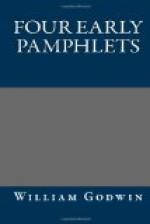And now, my lord, for the last head, which it is necessary to mention under this division of my subject, I mean that of lanthorns. Twenty people, I doubt not, whom your lordship might consult upon this occasion, would advise you to go without any lanthorn at all. Beware of this, my lord. It is a rash and a thoughtless advice. It may possibly be a false and insidious one. Your lordship will never think of going always in the same broad and frequented path. Many a causeway you will have to cross, many a dark and winding alley to tread. Suppose, my lord, the pavement were to be torn up, and your lordship were to break your shin! Suppose a drain were to have been opened in the preceding day, without your knowing any thing of the matter, and your lordship were to break your neck! Suppose, which is more terrible than all the rest, you were to set your foot upon that which I dare not name, and by offending the olfactory nerves of majesty, you were to forfeit his affections for ever!
So much, my lord, by way of declamation against the abolition of lanthorns. Your lordship however does not imagine I shall say any thing upon affairs so common as the glass lanthorn, the horn lanthorn, and the perforated tin lanthorn. This last indeed is most to my purpose, but it will not do, my lord, it will not do. There is a kind of lanthorns, your lordship has seen them, that have one side dark, and the other light. I remember to have observed your lordship for half a day together, poring over the picture of Guy Faux, in the Book of Martyrs. This was one of the early intimations which my wisdom enabled me to remark of the destination which nature had given you. You know, my lord, that the possessor of this lanthorn can turn it this way and that, as he pleases. He can contrive accurately to discern the countenance of every other person, without being visible himself. I need not enlarge to your lordship upon the admirable uses of this machine. I will only add, that my very dear and ever-lamented friend Mr. Pinchbeck, effected before he died an improvement upon it so valuable, that it cannot but preserve his name from that oblivious power, by which common names are devoured. In his lanthorn, the shade, which used to be inseparable, may be taken away at the possessor’s pleasure, like the head of a whisky, and it may appear to all intents and purposes one of the common vehicles of the kind. He had also a contrivance, never to be sufficiently commended, that when the snuff of the candle had attained a certain length, it moved a kind of automatic pair of snuffers that hung within side, and amputated itself. He left me two of these lanthorns as a legacy. Such is my value for your lordship, that I have wrought myself up to a resolution of parting with one of them in your lordship’s favour. You will receive it in four days from the date of this by Gines’s waggon, that puts up in Holborn.




